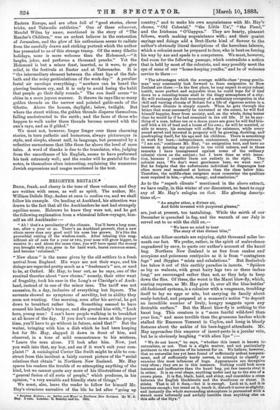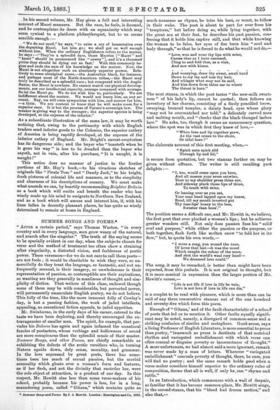BRIGHTER BRITAIN.*
BRISK, frank, and cheery is the tone of these volumes, and they
are written with sense, as well as spirit. The author, Mr. William Delisle Hay, dashes at once in medEas res, and we shall follow his example. On landing at Auckland, his attention was drawn to the fact that all the Aucklanders he met had strangely aquiline noses. Hebrews he knew they were not, and he got the following explanation from a whimsical fellow-voyager, him-
self an old Aucklander:— " Ah ! that's a peculiarity of the climate. You'll have a long nose, too, after a year or so. There's an Auckland proverb, that a new chum never does any good until his nose has grown. It's like the proverbial cutting of the wisdom-teeth. After inhaling this mag- nificent air of ours for a year or two, your nose will grow bigger, to receive it ; and about the same time, you will have spent the money you brought with you, gone in for hard work, learnt common-sense, and become colonised."
'New chum" is the name given by the old settlers to a fresh
arrival from England. His ways are not their ways, and his doings are regarded pretty mach as a " freshman's " are, or used to be, at Oxford. Mr. Hay, to bear out, as he says, one of the received theories about "new chums," namely, their utter want of frugality, took his ease in the Long's or Claridge's of Auck- land, instead of in one of the minor inns. The tariff was not excessive, 8s. a day, inclusive of everything but liquors. The servants showed no symptoms of servility, but in ability they seem not wanting. One morning, soon after his arrival, he got down to breakfast rather late. Something seemed to have creased his landlady's temper, and she greeted him with, "Look here, young man ! I can't have people walking in to breakfast at all hours of the day. If you don't come down at the proper time, you'll have to go without in future, mind that !" But the waiter, bringing with him a dish which he had been keeping
hot for Mr. Hay, slapped it down in front of him, and observed, in a tone of mild remonstrance to his mistress,
"Leave the man alone. I'll look after him. Now, just you walk into that, my boy, and see if it won't suit your com- plaint !" A. sociological envier like Swift might be able to con-
struct from this incident a fairly correct picture of the "social relations that obtain" in Northern New Zealand. Mr. Hay
spares his readers the trouble of so attempting anything of the kind, but we cannot quote any more of his illustrations of that "general fusion of all sorts of people," which produces, in his opinion, "a very amiable and friendly state of things."
We must, also, leave the reader to follow for himself Mr. Hay's vivacious narrative of the life he led after "going up
• Brighter Britain ; or, Settler and Maori in Northern New Zealand. By W. D. Hay. 2Y01*. London: E.. Bentley and Co. litga,
country," and to make his own acquaintance with Mr. Hay's chums, "Old Colonial," "the Little Un'," "the Fiend,' and the Irishman " O'Gaygnn." They are hearty, pleasant fellows, worth making acquaintance with ; and their quaint sayings and doings add a Bret-Harte kind of flavour to the author's obviously literal descriptions of the herculean labours, which a colonist must be prepared to face, who is bent on forcing his way by axe and spade to a competence. We must, however, find room for the following passage, which contradicts a notion. that is held by most of the colonists, and may possibly meet the eye of some of our "home-keeping youths," and be of welcome service to them :—
"The advantages which the average middle-class young gentle- man' may reasonably look forward to from emigration to New Zealand are these :—In the first place, he may expect to enjoy robust health, more perfect and enjoyable than he could hope for if tied' down to a counting-house stool in the dingy atmosphere of a city. He will exchange the dull monotony of a sedentary occupation in the chill and varying climate of Britain for a life of vigorous action in e. land whose climate is simply superb. When he gets through the briars that must necessarily be traversed at the outset, he will find himself happier, freer from anxiety, and, on the whole, doing better than he would be if he had remained in the old life. If he be any- thing of a man, before ten or a dozen years are gone he will find him- self with a bit of land and a house of his own ; he will be married, or able to marry, his earnings will suffice for existence, while every pound saved and invested in property will be growing, doubling, and, quadrupling itself, for his age and his children. There is something' to work for here,—independence, contentment, and competence. "I am not," continues Mr. Hay, "an emigration tout, and have no interest in painting my picture in too vivid colours, and in these remarks I have transgressed against some of the ordinary colonial views on the subject; but I have done so with inten- tion, because I consider them not entirely in the right. The- colonist says, We don't want gentlemen here, we want men P But he forgets that the unfortunate individual he disparages haw often more real manhood at bottom than the class below him, Therefore, the middle-class emigrant must remember the qualities. most required in him,—pluck, energy, and resolution."
As to the "superb climate" mentioned in the above extracts. we have really, in this winter of our discontent, no heart to copy any of Mr. Hay's eulogies on that. His glowing descrip- tions of,—
" An ampler ether, a diviner air,
And fields invested with purpureal gleams,"
are, just at present, too tantalising. While the mirth of our- December is quenched in fog, and the warmth of our July is served out to us with the chill on,— " We have no mind to hear
The story of that distant bliss,"
which our fellow-mortals are enjoying, eight thousand miles be- neath our feet. We prefer, rather, in the spirit of malevolence- engendered by envy, to quote our author's account of the kauri bug. Northern New Zealand is as free from snakes and' scorpions and poisonous centipedes as it is from "contagious fogs" and Stygian "mists and exhalations." But Beelzebub, has taken it out of this earthly paradise in insects. "Spiders. as big as walnuts, with great hairy legs two or three inches long," are encouraged rather than not, as they help to keep. down the flies. Of these, the worst is the Maori blow-fly, which; soaring supreme, as Mr. Hay puts it, over all the blue-bottles' old-fashioned systems, is a coloniser with a vengeance, troubling- itself to lay no eggs or nits, but carrying its family about ready-hatched, and prepared at a moment's notice "to deposit an incredible number of lively, hungry maggots upon any desirable surface." But the Maori blow-fly is nothing to the kauri bug. This creature is a "more fearful wild-fowl than. your lion," and more terrible than the gruesome leeches which, stalked Sir Emerson Tennent in Ceylon, and hung in bloody
festoons about the ankles of his bare-legged attendants. Mr. Hay approaches this emperor of insect-pests in a jocular veirr,. but he is obviously laughing "with alien lips"
"We do not know," he says, "whether this insect is known to naturalists, or not. That is a slight matter, and not particularly pertinent to the question of its interest for us. We believe, however,. that no naturalist has yet been found of sufficiently ardent tempera- ment, and of sufficiently hardy nerves, to attempt to classify or examine this most infamous of bugs. Appearances are deceptive very often ; they are so in this instance. Nothing could look more innocent and inoffensive than the kauri bug, yet few insects rival it in crime. It is an oval shape, anything under and up to the size of a crown piece. It is flat, black, hard, and shiny, and resembles a cross. between the English blackbeetle and the woodlouse or slater. It stinks. That is all it does,—but it is enough. Look at it, and it ie harmless enough; but tread on it, touch it, disturb it never so slightly, and instantly the whole surrounding atmosphere is permeated with a stench more infernally and awfully horrible than anything else on this side of the Styx."
In his second volame, Mr. Hay gives a full and interesting account of Maori manners. But the race, he feels, is doomed, and he contemplates its doom with an equanimity which may seem cynical to a platform philanthropist, but to us seems sensible enough :—
" We do not need," he says, "to raise a cry of lamentation over the departing Maori. Let him go ; we shall get on well enough without him. When the ordinary Englishman refers to the matter, he says They're a splendid race, those Maories ["Maori" and "kaari" should be pronounced like " cowry "1 and it's a thousand pities they should be dying out so fast.' With this commonly be- gins and ends the sum of his knowledge on the matter. Now, the Maori is not altogether such an absolutely superior person. Rela- tively to some aboriginal races,—the Australian black, for instance, and perhaps most of the North-American tribes,—the Maori may truly be described as a splendid race ; but compared with the Anglo- Saxon, the Maori is nowhere. He cannot match our physical develop- ments, nor our intellectual capacity, average compared with average. So let the Maori go. We do not wish him to, particularly. We are indifferent about the matter. We would not hurry him, on any ac- count. Nay, we will even sympathise with him, and sorrow for him, —a little. We are content to know that he will make room for a superior race. It is but the process of Nature's sovereign law. The weaker is giving way to the stronger ; the superior species is being developed, at the expense of the inferior."
As a subordinate illustration of the same law, it may be worth noticing that, owing to the pertinacity with which English traders send inferior goods to the Colonies, the superior cutlery of America is being rapidly developed, at the expense of the inferior cutlery of England. Mr. Bright's caveat-ernptorism has its dangerous side ; and the buyer who " boasteth when he is gone his way" is less to be dreaded than the buyer who sayeth, not in vain, after his purchase, "It is naught, it is naught !"
This notice does no manner of justice to the livelier portions of Mr. Hay's book,—to his vivacious sketches of originals like "Pirate Tom" and "Dandy Jack," to his bright, fresh pictures of colonial life and manners, or to the simplicity and clearness of his descriptions of scenery. We must make what amends we can, by heartily recommending Brighter Britain as a book which will excite and benefit the reader who has wisely made up his mind to emigrate to Northern New Zealand, and as a book which will amuse and interest him, if, with his lines fallen in decently pleasant places, he has quite as wisely determined to remain at home in England.



































 Previous page
Previous page